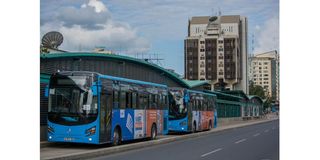Prime
Private sector to take over Tanzania’s BRT operations on Kimara and Mbagala routes

What you need to know:
- The remaining 99 buses are in production and expected to arrive before the end of the year. Additionally, 70 existing buses are being retrofitted to run on natural gas, which will improve efficiency and reduce emissions.
Dar es Salaam. As complaints from Dar es Salaam residents about the Bus Rapid Transit (BRT) service continue to rise, the Treasury Registrar Nehemiah Mchechu has announced that the private sector will assume operations of the first and second phases of the BRT project.
This change aims to address persistent service challenges faced by commuters and improve overall efficiency.
Currently, BRT services are managed by the UDA Rapid Transit Company (Udart), but the company will now focus on the third phase, which stretches from the city centre to Gongo la Mboto. The shift coincides with plans to invite strategic investors to purchase shares in Udart to improve governance and performance.
Mchechu’s announcement follows recent media reports detailing daily difficulties experienced by BRT users, as well as viral social media videos showing overcrowded buses and commuters climbing through windows—scenes that have triggered widespread public debate and concern.
During a media engagement on 2 June in Dar es Salaam, Mchechu shared insights into the project’s progress, challenges, and future plans. He explained that the Dar Rapid Transit Agency (DART), which manages the BRT infrastructure, is currently reviewing investment proposals from interested companies. Construction on the first and second phases has been completed, and the third phase is expected to finish before the end of this year.
With all phases completed, the project will no longer rely solely on Udart for operations. Instead, four to six service providers will manage different routes, diversifying operations and improving service delivery. This change comes after significant difficulties at Udart, which was initially a mostly private entity with limited government ownership but later became a predominantly government-owned entity.
“Due to internal challenges and mismanagement at Udart, the government stepped in, taking ownership of 85 percent of the company,” Mchechu explained. “Legal and judicial measures were taken to resolve outstanding issues.”
To address ongoing performance problems, Mchechu confirmed that the private sector will take over operation of the first phase, running from Kimara to Kivukoni, and the second phase, covering Gerezani to Mbagala. The third phase will remain under Udart’s management, though the company still requires major reforms to improve leadership and governance.
“We expect it to take about two years to fully implement these reforms. To support this, we will invite strategic partners and sell some shares,” he said.
Regarding the promise made in July 2024 to add 100 new buses, Mchechu said a prototype powered by natural gas is already in operation. The remaining 99 buses are in production and expected to arrive before the end of the year. Additionally, 70 existing buses are being retrofitted to run on natural gas, which will improve efficiency and reduce emissions.
Mchechu believes the arrival of new buses will help address many of the complaints from commuters, but emphasised that having multiple operators is crucial for sustainable service improvement.
In his July 2024 briefing, he noted the bus procurement project is being financed with support from NMB Bank through loans. “We continue to engage with NMB to resolve bus shortages and move the procurement forward,” he said.
The construction of feeder routes, designed to enhance connectivity to the BRT system, is also underway but will follow separate procedures from the main phases.
Acknowledging the project’s difficult beginnings, Mchechu noted challenges such as debt accumulation and frequent bus breakdowns. “The company started as a private entity, but many issues arose, which the government has been working hard to resolve,” he said.
He promised that the DART board chair and director would soon provide further updates on strategies to improve the BRT system.
The decision to involve private operators has been welcomed by some commuters, who said it should have happened much earlier.
“The government should have remained a regulator, collecting taxes and ensuring compliance, while leaving service delivery to private companies from the start. That would have prevented many of the current problems,” said Kimara resident Rebecca Masha.
Her view was supported by Aman Nickson, who cited the success of ferry services in Kigamboni as a positive example. “Ferry operations have improved dramatically—people used to wait over 30 minutes, but now they run smoothly. Meanwhile, BRT users still face long waits, sometimes up to two hours. Often, it’s quicker to use other means of transport,” he said.
With private sector involvement now confirmed, Dar es Salaam’s BRT users hope for a smoother and more reliable commuting experience in the near future.





